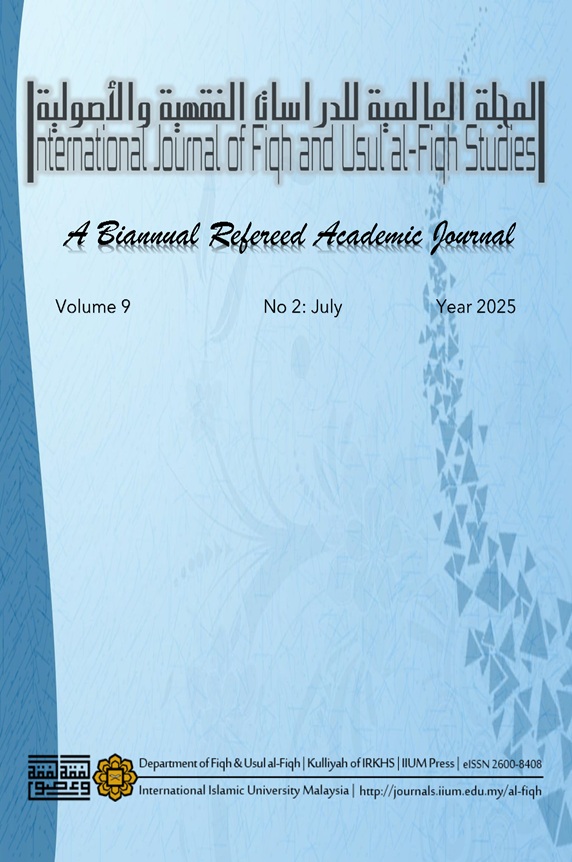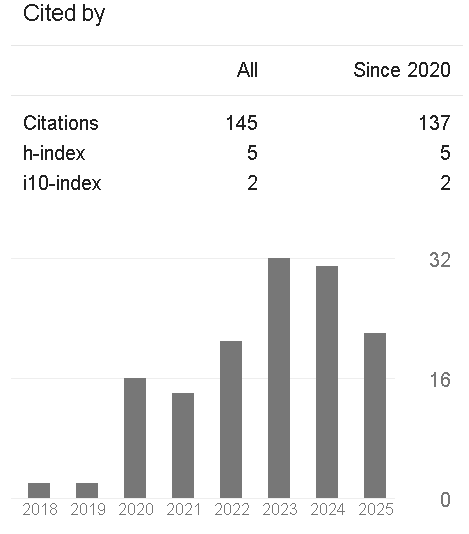Qiyās on Rukhṣah and Its Impact on Solving Contemporary Muʿāmalāt Issues: A Jurisprudential Analysis
DOI:
https://doi.org/10.31436/ijfus.v9i2.372Keywords:
Qiyās, ʽillah, rukhṣah, Islamic financeAbstract
Qiyās is one of the acceptable adillah (proofs) in Islam for deriving Sharīʿah rules. According to the view of Imām al-Shāfiʿī and other Uṣuliyyūn (Uṣūlī scholars), qiyās can be applied in all areas of Islamic law including rukhṣah matters, especially in muʿāmalāt and Islamic finance, as long as the ʽillah in the laws is found. Although the topic of qiyās on rukhṣah is very important as it explains the process of qiyās and its scope and limitations, this topic has yet to be sufficiently discussed by researchers. Therefore, this study attempts to examine this topic and its role in istidlāl/deduction of law process, especially in the muʿāmalāt and Islamic finance area. The study is based entirely on library research. It finds that qiyās on rukṣah plays an important role in deriving new Sharīʿah rules based on the existing cases from the Qurʾān and Sunnah. For qiyās on rukhṣah in muʿāmalāt and Islamic finance matters, the study finds that it is very important to consider urgent needs and difficulties, especially in the current economic situation. This is because rukhṣah is a form of relaxation due to constraints and difficulties in the execution and implementation of a Sharīʿah law, and in the current economic context, where there are many constraints arising because of the dominating conventional monetary system, qiyās on rukhṣah is indispensable. Among the most important research findings are the permissibility of baiʽ al-ʽarāyā in selling raisin with grape, the right of withdrawing hibah assets being extended to other than fathers, the acquisition of shares of companies involved in the production of medicine made from excretory/najis elements, and the permissibility of holding Sharīʿah non-compliant shares in loss situations and others.
Downloads
Metrics
References
ʿAbd al-ʿAzīz, M. A. (2001). Maqāṣid al-sharīʿah fī al-qawāʿid al-fiqhiyyah. Dār al-Bayān li-al-Nashr wa-al-Tawzīʿ.
Abū Dāwūd, S. ibn A. (2009). Sunan Abī Dāwūd (S. al-Arnāwūṭ et al., Eds.). Dār al-Risālah al-ʿĀlamiyyah.
Aḥmad ibn Ḥanbal. (2001). Musnad Aḥmad ibn Ḥanbal (S. al-Arnāwūṭ, ʿA. Murshid, et al., Eds.). Muʾassasah al-Risālah.
Ahmad Zakirullah Mohamed Shaarani. (2021). Konsep taʿabbudiy dan maʿqūlat al-maʿnā dan kesannya dalam pengeluaran hukum syarak semasa: Analisis aplikasi dalam operasi zakat dan produk bersuci. Journal of Fatwa Management and Research, 26(1), 114–136. https://doi.org/10.33102/jfatwa.vol26no1.342
Aisha Mubārak Aldhabah Alketbī. (2024). Qāʿidat al-qiyās ʿalā al-rukhṣah. Majallah ʿArabiyyah li-Dirāsāt al-Islāmiyyah, 8(26), 224–254. http://jasis.journals.ekb.eg/
al-Azharī, S. ibn ʿU. ibn M. (n.d.). Ḥāshiyat al-Jamal. Dār al-Fikr.
al-Baghawī, Ḥ. ibn M. (1997). Al-Tahdhīb fī al-fiqh al-imām al-Shāfiʿī. Dār al-Kutub al-ʿIlmiyyah.
al-Bājī, A. al-W. S. ibn Kh. (1995). Al-Iḥkām al-fuṣūl fī aḥkām al-uṣūl (ʿA. al-M. Turkī, Ed.). Dār al-Gharb al-Islāmī.
al-Bayḥaqī, A. ibn Ḥ. (1989). Sunan ṣughrā (ʿA. al-M. A. al-Q., Ed.). Jamīʿah Dirāsāt al-Islāmiyyah.
al-Bayḥaqī, A. ibn Ḥ. (2003). Al-sunan al-kubrā (M. ʿA. al-Q. ʿA., Ed.). Dār al-Kutub al-ʿIlmiyyah.
al-Bukhārī, M. ibn I. (2002). Ṣaḥīḥ al-Bukhārī. Dār Ibn Kathīr.
al-Dumyāṭī, S. al-B. ibn M. Sh. (n.d.). Ḥāshiyat iʿānat al-ṭālibīn. Dār al-Fikr.
al-ʿAllāʾī, A. S. Kh. ibn K. (1994). Al-majmūʿ al-mudhhab fī qawāʿid al-madhhab (M. ibn ʿA. al-Gh., Ed.). Wizārat al-Awqāf wa-al-Shuʾūn al-Islāmiyyah.
al-Ghazālī, A. Ḥ. M. ibn M. (1997a). Al-mustaṣfā min ʿilm al-uṣūl. Muʾassasah al-Risālah.
al-Ghazālī, A. Ḥ. M. ibn M. (1997b). Al-wajīz fī fiqh al-imām al-Shāfiʿī (ʿA. ʿA. al-M. & ʿA. M., Eds.). Dār al-Arqam ibn Abī al-Arqam.
al-Ḥanāʾī, Z. ibn S., & Mujāhid, M. S. ibn Kh. (2022). Taʿaddud manāhij al-uṣūliyyīn fī taʿrīf al-qiyās: Al-asbāb wa-al-āthār. Journal of Fiqh and Usul Fiqh, IIUM. https://journals.iium.edu.my/pub/al-fiqh/public/journals/1/pageHeaderLogoImage_en_US.png
al-ʿImrānī, Y. ibn A. al-Kh. (2000). Al-bayān fī al-madhhab al-Shāfiʿī. Dār al-Minhāj li-al-Ṭibāʿah wa-al-Nashr wa-al-Tawzīʿ.
al-Isnawī, J. al-D. ʿA. al-R. ibn Ḥ. (1999). Nihāyat al-sūl sharḥ minhāj al-wuṣūl fī ʿilm al-uṣūl. Dār al-Kutub al-ʿIlmiyyah.
al-Juwaynī, ʿA. al-M. ibn ʿA. A. (1979). Al-burhān fī uṣūl al-fiqh (ʿA. al-D., Ed.). [Qatar].
al-Juwaynī, ʿA. al-M. ibn ʿA. A. (2007). Nihāyat al-maṭlab fī dirāyat al-madhhab (ʿA. al-ʿA. M. D., Ed.). Dār al-Minhāj li-al-Nashr wa-al-Tawzīʿ.
al-Khādimī, N. al-D. ibn M. (2001). ʿIlm maqāṣid al-sharīʿah. Maktabat al-ʿUbaykān.
al-Kurdī, W. A. ibn ʿA. R. (2011). Taḥrīr al-fatāwā ʿalā al-tanbīh wa-al-minhāj wa-al-ḥāwī (al-nukat ʿalā al-mukhtaṣarāt al-thalāth). Dār al-Minhāj li-al-Nashr wa-al-Tawzīʿ.
al-Miṣrī, R. Y. (2001). Al-jāmiʿ fī uṣūl al-ribā. Dār al-Qalam.
al-Namlah, ʿA. al-K. (1999). Al-muhadhdhab fī ʿilm uṣūl al-fiqh al-muqāran. Maktabat al-Rushd.
al-Nawawī, A. Z. M. al-D. Y. ibn Sh. (n.d.). Al-majmūʿ sharḥ al-muhadhdhab. Maktabat Irshād.
al-Nawawī, Y. ibn Sh. (1929). Sharḥ ṣaḥīḥ Muslim. Maktabah Miṣriyyah bi-al-Azhar.
al-Qalyūbī, Sh. al-D. A. ibn A., & al-ʿUmayrah, Sh. al-D. A. al-B. (1955). Ḥāshiyat al-Qalyūbī wa-ʿUmayrah ʿalā sharḥ al-Maḥallī ʿalā minhāj al-ṭālibīn. Muṣṭafā al-Bābī al-Ḥalabī.
al-Rāfiʿī, ʿA. al-K. ibn M. (1997). Al-ʿazīz sharḥ al-wajīz (ʿA. ibn M. M. & ʿA. A. ʿA. al-M., Eds.). Dār al-Kutub al-ʿIlmiyyah.
al-Ramlī, M. ibn A. al-ʿA. (2003). Nihāyat al-muḥtāj ilā sharḥ minhāj [with Ḥāshiyat ʿAlī ibn ʿAlī al-Shabralamsi, Ḥāshiyat Muḥammad ibn Aḥmad al-Maghribī al-Rashīdī]. Dār al-Kutub al-ʿIlmiyyah.
al-Rāzī, F. al-D. M. ibn ʿU. (1992). Al-maḥṣūl fī ʿilm al-uṣūl (Ṭ. J. F. al-ʿA., Ed.). Muʾassasah al-Risālah.
al-Sarakhsī, A. ibn A. S. (1983). Uṣūl al-Sarakhsī (A. al-W. al-A., Ed.). Dār al-Kutub al-ʿIlmiyyah.
al-Shāfiʿī, M. ibn I. (2001). Al-umm (R. F. ʿA. al-M., Ed.). Dār al-Wafāʾ.
al-Shāṭibī, I. ibn M. (1997). Al-muwāfaqāt fī uṣūl al-sharīʿah (A. ʿU. M. ibn Ḥ., Ed.). Dār Ibn ʿAffān.
al-Shīrāzī, A. I. I. ibn ʿA. (1996). Al-muhadhdhab (M. Z., Ed.). Dār al-Qalam.
al-Shirbīnī, Sh. al-D. M. ibn A. al-Kh. (n.d.). Mughnī al-muḥtāj ilā maʿrifat maʿānī alfāẓ al-minhāj (Ṭ. ʿA. al-R. S., ʿI. Z. al-B., & M. ʿI., Eds.). Maktabah Tawfīqiyyah.
al-Sindī, M. ibn ʿA. al-H. (n.d.). Ḥāshiyat al-Sindī ʿalā sunan Ibn Mājah. Dār al-Jīl.
al-Suyūṭī, J. al-D. ʿA. al-R. ibn al-K. (1997). Al-ashbāh wa-al-naẓāʾir fī qawāʿid wa-furūʿ al-fiqh al-Shāfiʿiyyah. Maktabat Naẓār al-Bāz.
al-Tirmidhī, M. ibn ʿĪ. ibn S. (1967). Sunan al-Tirmidhī (M. F. ʿA. al-B., Ed.). Muṣṭafā al-Bāb al-Ḥalabī.
al-Zanjānī, Sh. al-D. M. ibn A. (n.d.). Takhrīj al-furūʿ ʿalā al-uṣūl (A. Ṣ., Ed.). Muʾassasah al-Risālah.
al-Zarkashī, B. al-D. M. ibn B. (2007). Al-baḥr al-muḥīṭ fī uṣūl al-fiqh. Dār al-Kutub al-ʿIlmiyyah.
Hamdi Taha. (2016). Al-qiyās fī al-rukhṣah al-sharīʿiyyah wa-atharuhu fī al-furūʿ al-fiqhiyyah al-muʿāṣirah. [Journal Name], 16(1), 585–760. https://journals.ekb.eg/article_12271.html
Ibn al-Qayyim al-Jawzī, M. ibn A. B. (2002). Iʿlām al-muwaqqiʿīn ʿan rabb al-ʿālamīn (A. ʿU. M. ibn Ḥ., Ed.). Dār Ibn al-Jawzī.
Ibn al-Rifʿah, N. al-D. M. ibn A. (2009). Kifāyat al-nabīh sharḥ al-tanbīh fī fiqh al-imām al-Shāfiʿī [with Hidāyah ilā awhām al-kifāyah by al-Isnāwī] (N. M. S. B., Ed.). Dār al-Kutub al-ʿIlmiyyah.
Ibn al-Samʿānī, A. M. M. ibn M. (1998). Qawāṭiʿ al-adillah fī uṣūl al-fiqh (ʿA. A. ibn Ḥ., Ed.). Maktabat Tawbah.
Ibn Ḥajar al-ʿAsqalānī, A. ibn ʿA. (2001). Fatḥ al-bārī ʿalā sharḥ ṣaḥīḥ al-Bukhārī (ʿA. Q. Sh. al-Ḥ., Ed.). [Sponsored by Amīr Sulṭān ibn ʿAbd al-ʿAzīz, Royal Family of Saʿūd].
Mālik ibn Anas. (2004). Muwaṭṭaʾ (M. M. al-Aʿẓamī, Ed.). Muʾassasah Zāyid ibn Sulṭān.
Muslim ibn al-Ḥajjāj. (2006). Ṣaḥīḥ Muslim (N. ibn M. al-F. A. Q., Ed.). Dār al-Ṭībah.
Nora Muhammad. (2023). Al-qiyās fī al-rukhṣah al-sharīʿiyyah wa-atharuhu fī al-fiqh al-islāmī. [Journal Name], 14(14), 401–454. https://journals.ekb.eg/article_12271.html
Omar Monah. (2019). Al-qiyās fī al-rukhaṣ wa-ahammiyyatuhā fī ʿamaliyyat al-ijtihād. Majallat Ishāmāt li-al-Buḥūth wa-al-Dirāsāt, 4(2), 51–63. https://asjp.cerist.dz/en/article/166651
Roslan, M. M., & Zainuri, A. O. (2023). Kekhilafan menerapkan maqasid syariʻah dalam pengeluaran fatwa: Analisis ijtihad maqasidi. Journal of Fatwa Management and Research, 28(1), 132–148. https://doi.org/10.33102/jfatwa.vol28no1.464
Websites
Guidelines for Stem cell research and therapy, https://www.moh.gov.my/moh/resources/Penerbitan/Perkhidmatan%20OnG%20&%20Ped/STEM%20CELL/1._Guideline_For_Stem_Cell_Research_And_Therapy_.pdf
Al-Salihin Trustee, “Pri Hibah”, retrieved on 11 April 2025, https://as-salihin.com/perkhidmatan/deklarasi-hibah-pri-hibah/.
Dow Jones Islamic Market Indices Methodology, retrieved on 11 April 2025, https://www.spglobal.com/spdji/en/documents/methodologies/methodology-dj-islamic-market-indices.pdf.
Securities Commission, Resolutions of the Securities Commission Shariah Advisory Council, https://www.sc.com.my/api/documentms/download.ashx?id=511180c4-b0f1-49e3-9f92-46efe55457bc. retrieved on 29 June 2018
MSCI Islamic Indexes Series, retrieved on 10 April 2025. “Methodology”, https://www.msci.com/eqb/methodology/meth_docs/MSCI_May11_IslamicMethod.pdf.
FR IdealRatings Islamic Indices – Index Methodology. Retrieved on 12 April 2025. https://www.lseg.com/content/dam/ftse-russell/en_us/documents/methodology/idealratings-islamic-indices-methodology.pdf.
Downloads
Published
How to Cite
Issue
Section
License
Copyright (c) 2025 International Journal of Fiqh and Usul al-Fiqh Studies

This work is licensed under a Creative Commons Attribution-NonCommercial 4.0 International License.
The IIUM journal follows the open access policy.
Consent to publish: The Author(s) agree to publish their articles with IIUM Press.
Declaration: The Author(s) declare that the article has not been published before in any form and that it is not concurrently submitted to another publication, and also that it does not infringe on anyone’s copyright. The Author(s) holds the IIUM Press and Editors of the journal harmless against all copyright claims.
Transfer of copyright: The Author(s) hereby agree to transfer the copyright of the article to IIUM Press, which shall have the exclusive and unlimited right to publish the article in any form, including in electronic media. However, the Author(s) will reserve the right to reproduce the article for educational and scientific purposes provided that the written consent of the Publisher is obtained. For the article with more than one author, the corresponding author confirms that he/she is authorized by his/her co-author(s) to grant this transfer of copyright.





















